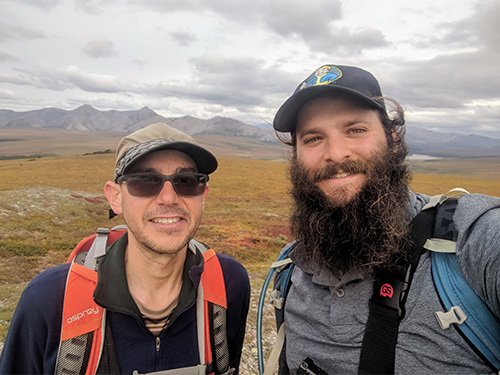Cameron McMillan grew up in Albuquerque, New Mexico, a mid-size city in a desert landscape of greens, browns and reds with a crown of photo-perfect mountains.
With nature’s beauty so accessible, it’s little wonder that McMillan enjoys the outdoors.

Cameron McMillan, right, a Ph.D. candidate in biology, and his faculty mentor, Dr. Michael Weintraub, a professor of soil ecology at UToledo, in the field.
“I love being outside and exploring the outdoors and biking,” said the 30-year-old Ph.D. candidate in biology. “My fiancé and I try to bike, kayak, hike, XC-ski and do other outdoor activities every week, and we like to travel to do these things.”
McMillan’s love of the outdoors, though, is more than a lifestyle. It’s his field of study as a researcher. He recently learned that he is one of 44 Ph.D. students nationwide selected by the U.S. Department of Energy to conduct research at its national laboratories.
“It’s easily the most exciting achievement in my professional life,” he said. “I hope to learn a lot about advanced instrumentation and data analysis.”
Through the Department of Energy’s graduate research fellowship, McMillan will continue his environmental microbiology research started at UToledo, investigating how temperature controls arctic soil decomposition, at Pacific Northwest National Laboratory, located in Richland, Washington, working side-by-side with a DOE laboratory scientist.
“Arctic soils contain large stocks of carbon — more than four times what is currently in the atmosphere — that has been locked away due to historically low temperatures. As the globe warms and the Arctic is warming faster than other regions, understanding how changing temperatures affect soil carbon release becomes more important to predict climates in a changing world,” McMillan said. “So, I have been focusing on how low temperatures affect carbon release from arctic soil. We have found big implications for how antecedent temperatures play a large role in soil decomposition.”
McMillan first came to UToledo after graduating from Northern Arizona University in Flagstaff with a bachelor of science in microbiology with a minor in chemistry, and bachelor of science in physics with a minor in mathematics. He knew he wanted to earn a Ph.D. in the field of biology. It was Dr. Egbert Schwartz, an advisor at NAU, who suggested he mentor under Dr. Michael Weintraub, professor of soil ecology at UToledo.

McMillan will continue his environmental microbiology research started at UToledo as one of 44 Ph.D. students nationwide selected by the U.S. Department of Energy to conduct research at its national laboratories.
“My journey has gone in many directions, but the core principle I work by is to not make rigid goals, allowing me to be flexible. This is in part how I ended up in Toledo.”
McMillan joined Dr. Weintraub’s team to work together to understand the temperature controls on arctic soil decomposition.
“In the field, Mike and I had a manipulative experiment where we built snow fences to create deeper snow,” McMillan added. “In the winter, larger snow depths can insulate soil causing warmer but still frozen soil conditions. We take soil measurements such as carbon flux, soil nutrients and soil moisture and collect soils for temperature-controlled laboratory incubations.”
Weintraub credits McMillan’s tenacity as a researcher for why he received this career opportunity.
“The diligence and perseverance Cameron has shown speaks volumes about his high level of motivation and enthusiasm, which were recognized by the Pacific Northwest National Lab in awarding him a prestigious – and highly competitive — graduate research fellowship,” he said.” By combining hard-won arctic field data, mechanistic experiments and advanced analyses at PNNL, Cameron’s research during this fellowship will improve our understanding of how Arctic soils will respond to a warming environment.”
McMillan, though, is quick to credit Weintraub.
“Mike is an incredibly strong advisor. He identifies students’ biggest needs and helps them focus on these items, which has helped me in developing meaningful research and hone my ability to communicate this research,” he said. “After spending a lot of time together in the arctic and around Toledo we have developed a strong relationship. I hope to be able to continue doing work with Mike in the future as a colleague; and without question as a friend.”
Weintraub also has been instrumental in helping McMillan prepare his future beyond UToledo.
“Mike has tons of contacts within academia and research, but he also helped me identify a need for networking outside of these circles,” he said. “And Mike encouraged me to take some business classes where I was able to get connected to several industry experts in science fields, opening up new opportunities and giving me more long-term flexibility.”